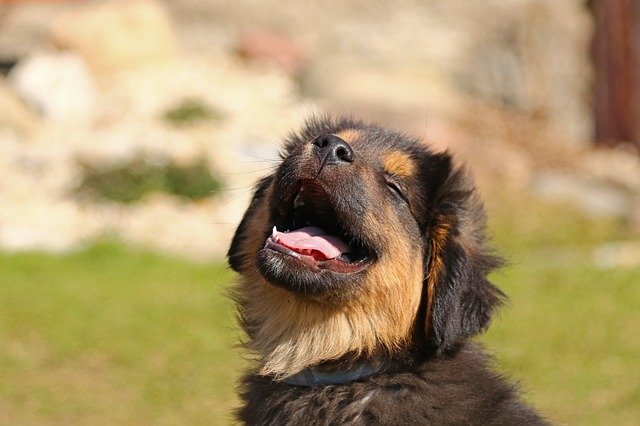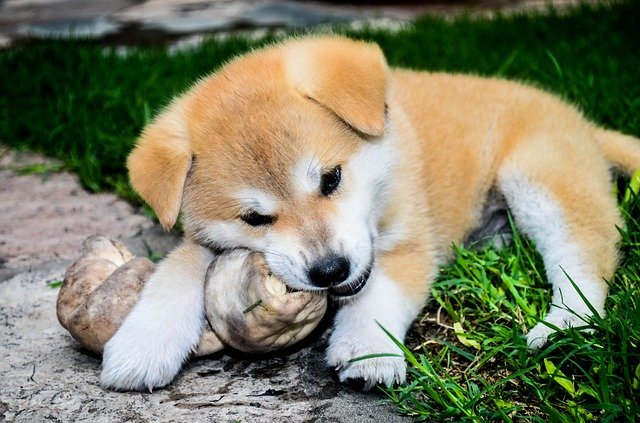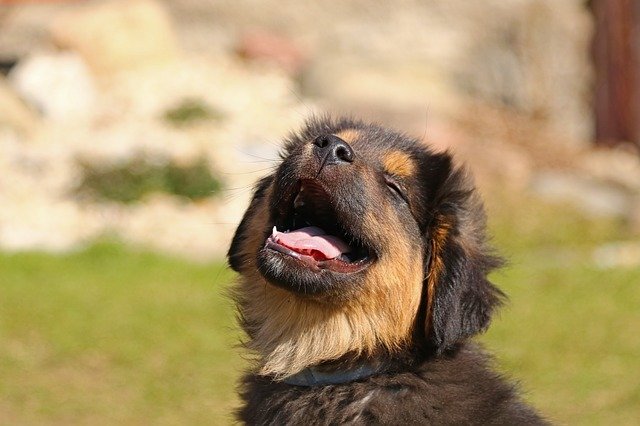Having a puppy is exciting, and you want to experience it at its best. But puppies can be a handful sometimes as they’re hyper-energetic during their first few years.
Even if you adore your pup, you might still find yourself asking, “When do puppies calm down?” and wondering what you can do to support them during that period.
We’ll cover all you need to know and more:
- Important Factors for High Energy Levels
- Puppy’s Energy Level According to Age
- What Is Overstimulation?
- How You Can Calm Them Down
- Bathing Your Hyper Pup
Important Factors for High Energy Levels
Like children, young puppies are full of energy and wonder about the world. All they want to do when awake is explore, and you could say that every puppy is an excited puppy.
That said, it’s challenging to determine how high energy your pup will be. Let’s see what that depends on:
Breed
Just by observing dogs in the park, you’ll notice that some are way more active than others. For instance, working breeds and sporting dogs usually have much more energy as pups and adults, as they were bred specifically for that reason. These are dogs like Border Collies, Dalmatians, and Australian Shepherds.
In contrast, Bulldogs and Teacup Bichon Frises have less puppy energy. Smaller breeds usually calm down in 6–12 months, compared with the 1–2 years needed for larger dogs.
Gender
Due to their early reproductive maturity, females usually get calm earlier than males.
A common misconception states that spaying or neutering your puppy will decrease its energy level. But that’s only partially true. It might eliminate unwanted behaviors, like scent marking, but it won’t change the defining personality traits.
Social Structure
If you have older dogs, you’ll notice that calming the puppy will get easier. They’ll take care of the little one and correct it if it misbehaves.
The puppy would be the youngest pack member, so older and calmer dogs will guide it to becoming a more mature family member. That’s why we encourage you to socialize your puppy with older dogs.

Puppy’s Energy Level According to Age
Even if every puppy is different, we can observe a similar energy pattern depending on the age. Let’s check the essential periods of puppy energy levels by age:
0–10 Weeks
When puppies first come into this world, they can’t fend for themselves. They stay close to their mother and get stronger until they open their eyes at two weeks of age.
They can stand and even move around their whelping box in the third week. When they reach one month, they can see, smell, and hear. That’s also when their teeth start to come out.
After the fifth week, they get more energy by switching to various foods. They use that energy to explore and start socializing. In the next few weeks, you’ll start noticing a more hyper puppy. They love to run around and play. That’s also when they start chewing stuff, which is good for practicing bite inhibition. During these weeks, puppies also develop fear.
10–16 Weeks
That might be the most frustrating period of raising puppies. They pretty much act like teenagers, being reckless and testing out your boundaries. Usually, they get into all sorts of trouble, so it’s crucial to establish what they can and can’t do.
Puppies have very short attention spans, so training them can be harder. You have to be persistent because it’ll be worth it. That’s also the period when they’re teething, so keep your belongings safely packed away.
So, at what age are puppies most hyper? That is usually between the 10 and 16 week of their life.
4–6 Months
At this age, puppies start socializing them more with other dogs. They’ll play-fight, chase, and bite others and you, so make the most out of having fun with them.
It’s also crucial to notice your dog’s aggression, anxiety, and fears. You should work on them to avoid them becoming deeply instilled. If you need help with that, check out The Online Dog Trainer and Dog Obedience & Puppy Training.
6–12 Months
During this period, your pup learns the family routine and becomes easier to train, but it’ll still have high energy levels. Try giving it longer walks and increasing exercise times, but you might still need to discipline your pup.
So when do puppies calm down? While the answer depends on many factors, it usually happens during this period.
1–2 Years
By this stage, your pup is a young adult and has calmed down. Depending on the breed, that may happen earlier or later in this period. Still, you’ll surely notice it becoming calmer and obedient. You should still keep training it, though.
What Is Overstimulation?
Sometimes your puppy acts so hyper because it’s overstimulated. That’s when all kinds of stimuli constantly abuse the brain, and it can’t relax. It may be a form of:
- Sensory stimulation — the ringing of telephones, doorbells, alarm clocks, or sirens
- Visual stimulation — cars passing by, joggers, children playing, or the postal service worker getting close
That activates the fight or flight response, and you might notice a few things happening to your overstimulated puppy. For instance, its heart starts beating fast, the pupils dilate, and muscles grow stronger. Your pup might begin acting erratic, biting, chewing, and chasing its tail. Repeating overstimulation might lead to a chronic condition where your pup is constantly alert, anxious, and engages in compulsive behaviors.
How You Can Calm Them Down
To help your dog through this period, you need to establish some rules and train it. Here are a few ways to do this:
Regular and Mental Exercise
They can be your savior during the worst puppy age. Go on long walks, run with your pup, and organize play dates with other dogs to deplete all that high energy. It’s a win-win situation. You’ll deal with the issue, and your pup will love you even more.
You can also use mental exercises to spend all that high energy. Toys like Busy Buddy Magic Mushroom or Kibble Chase Roaming Treat Dropper do wonders. They’re excellent exercises when your puppy is bored at home.
Routines
When does puppy energy go away? Establishing a routine and sticking to it might be the answer you’re looking for. Dogs have an excellent internal clock, so they’ll be waiting for that regular walk and stay calm until then.

Control Feeding Habits
Be smart about your pup’s feeding schedule. Don’t give food right before going to sleep as that will increase the energy, and the pup will have a hard time falling asleep due to digestion. Try feeding it at least 3–4 hours before going to sleep. Follow your puppy’s sleep schedule to avoid having your puppy hyper at night.
To obtain the energy needed for a strong and healthy pup, you need to choose specific food for your puppy’s needs. Always look closely at the ingredients before buying.
Crate Training
It’s among the best training methods that benefit you and your pup. Some may consider it a form of punishment, but it’ll become a safe space for your dog.
Crate training a puppy will calm a puppy down by establishing a safe and secure zone that helps with fear and anxiety. It’s beneficial whether your pup is alone or you have people over. It provides a space they feel comfortable in.
Crate training teaches your pup to differentiate between “go time” and “calm time” and lowers its energy levels in the crate. Whenever your puppy starts causing problems, just put it there to calm it down.
Obedience Training
You have to teach your dogs to listen to you. Instead of asking, “When will my puppy calm down?” teach it to sit down or shake on command, and you can use this to solve your problem.
Learning such tasks requires a lot of energy from your dog, but it’s also like a fun game. It’s essential to follow a routine for this, too. Let your puppy know when you’re training or just playing, and it’ll give you full attention.
Ignoring Your Dog
So when do puppies settle down? That usually happens around their first year, but before that, consider ignoring them as a way to calm them. Even if it seems cruel, it can help.
Don’t make a big deal when leaving or coming back home. We know you’re really excited to see your fluff, but try to ignore it until it calms down. Otherwise, every time you leave, your pup might miss you a bit too much. That can turn into destructive behavior and barking until you come back to calm it.
Bathing Your Hyper Pup
Having a young pup means taking care of it and bathing it often. But all that high energy might complicate the task. So what can you do when your puppy is too hyper for a bath?
Have Everything Near You
If you get ready properly, you can hold your fluff in one hand. Prepare a brush, dry cloth, and shampoo, and make sure to get rid of all the dirt and shedding. Also, put a non-slip bath mat to prevent your pup from slipping. It’s essential to use a special dog shampoo for puppies. It should be natural and hypoallergenic to avoid irritating the skin.
Bribe Your Pup
If your dog doesn’t want to get in the tub, bribe it. Get some treats and throw one in the tub. When your dog goes in to get it, praise it. Repeat this a few more times to give your pup a positive feeling about bathing time.
Calm Its Fears
If your puppy is too excited or afraid, that might lead to hyperactive puppy biting. Remain calm and try to introduce it to the environment slowly. Let your pup near the neighborhood sprinklers or take it to the beach.
So, What Did We Learn?
Growing up is hard for you and your puppy. It’s an exciting time, but sometimes puppies get a little too excited, and you end up with chewed-up furniture or constant barking.
So when do puppies calm down, and how to deal with their high energy? You can expect smaller breeds to calm down around 6–12 months and larger ones around 1–2 years.
Until then, you can use all the techniques above, and we assure you that you can be a perfect parent to your fluff. But what we recommend the most is to have fun with it. Even if it’s stressful, it’s one of the most exciting and fun periods of being a pup parent.


